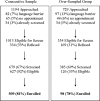PTSD in urban primary care: high prevalence and low physician recognition
- PMID: 17503105
- PMCID: PMC2219859
- DOI: 10.1007/s11606-007-0161-0
PTSD in urban primary care: high prevalence and low physician recognition
Abstract
Background: Posttraumatic stress disorder (PTSD) is associated with medical and psychological morbidity. The prevalence of PTSD in urban primary care has not been well described.
Objective: To measure the prevalence of PTSD in primary care patients overall and among those with selected conditions (chronic pain, depression, anxiety, heavy drinking, substance dependence (SD), irritable bowel syndrome (IBS), and immigrant status).
Design: Cross-sectional study.
Participants: English-speaking patients aged 18-65 years old, awaiting primary care appointments in an urban academic medical center, were eligible for enrollment to determine PTSD prevalence (N = 509). Additional eligible participants (n = 98) with IBS or SD were subsequently enrolled.
Measurements: PTSD (past year) and trauma exposure were measured with Composite International Diagnostic Interview. We calculated the prevalence of PTSD associated with depression, anxiety, heavy drinking, SD, IBS, and chronic pain. Only the analyses on heavy drinking, SD, and IBS used all 607 participants.
Results: Among the 509 adults in primary care, 23% (95% CI, 19-26%) had PTSD, of whom 11% had it noted in the medical record. The prevalence of PTSD, adjusted for age, gender, race, and marital and socioeconomic statuses, was higher in participants with, compared to those without, the following conditions: chronic pain (23 vs 12%, p = .003), major depression (35 vs 11%, p < .0001), anxiety disorders (42 vs 14%, p < .0001), and IBS (34 vs 18%, p = .01) and lower in immigrants (13 vs 21%, p = .05).
Conclusions: The prevalence of PTSD in the urban primary care setting, and particularly among certain high-risk conditions, compels a critical examination of optimal approaches for screening, intervention, and referral to PTSD treatment.
Figures

Comment in
-
In the shadow of Iraq: posttraumatic stress disorder in 2007.J Gen Intern Med. 2007 Jun;22(6):888-9. doi: 10.1007/s11606-007-0172-x. J Gen Intern Med. 2007. PMID: 17375357 Free PMC article. No abstract available.
Similar articles
-
Reduced Symptoms of Post-Traumatic Stress Disorder and Irritable Bowel Syndrome Following Mindfulness-Based Stress Reduction Among Veterans.J Altern Complement Med. 2018 Dec;24(12):1159-1165. doi: 10.1089/acm.2018.0135. Epub 2018 Aug 30. J Altern Complement Med. 2018. PMID: 30160516
-
Trauma and posttraumatic stress disorder in an urban Xhosa primary care population: prevalence, comorbidity, and service use patterns.J Nerv Ment Dis. 2003 Apr;191(4):230-6. doi: 10.1097/01.NMD.0000061143.66146.A8. J Nerv Ment Dis. 2003. PMID: 12695733
-
Characterizing primary care patients with posttraumatic stress disorder using electronic medical records: a retrospective cross-sectional study.Fam Pract. 2024 Aug 14;41(4):434-441. doi: 10.1093/fampra/cmac139. Fam Pract. 2024. PMID: 36490368
-
[Posttraumatic stress disorder (PTSD) as a consequence of the interaction between an individual genetic susceptibility, a traumatogenic event and a social context].Encephale. 2012 Oct;38(5):373-80. doi: 10.1016/j.encep.2011.12.003. Epub 2012 Jan 24. Encephale. 2012. PMID: 23062450 Review. French.
-
Posttraumatic stress disorder in primary care: a hidden diagnosis.J Clin Psychiatry. 2004;65 Suppl 1:49-54. J Clin Psychiatry. 2004. PMID: 14728097 Review.
Cited by
-
Probable Posttraumatic Stress Disorder and Psychiatric Co-morbidity among Latino Primary Care Patients in Puerto Rico.J Depress Anxiety. 2012 Dec;1(5):124. doi: 10.4172/2167-1044.1000124. J Depress Anxiety. 2012. PMID: 25635240 Free PMC article.
-
Impact of Collaborative Care for Underserved Patients with PTSD in Primary Care: a Randomized Controlled Trial.J Gen Intern Med. 2016 May;31(5):509-17. doi: 10.1007/s11606-016-3588-3. Epub 2016 Feb 5. J Gen Intern Med. 2016. PMID: 26850413 Free PMC article. Clinical Trial.
-
[Trauma and psychological distress in dermatological patients].Hautarzt. 2015 Dec;66(12):933-9. doi: 10.1007/s00105-015-3709-7. Hautarzt. 2015. PMID: 26481957 Review. German.
-
Trauma related psychiatric disorders and their correlates in a clinical sample: A cross-sectional study in trauma affected patients visiting a psychiatric clinic in Nepal.PLoS One. 2020 Jun 15;15(6):e0234203. doi: 10.1371/journal.pone.0234203. eCollection 2020. PLoS One. 2020. PMID: 32541999 Free PMC article.
-
Treating Post-traumatic Stress Disorder with a Prolonged Exposure Protocol Within Primary Care Behavioral Health: A Case Example.J Clin Psychol Med Settings. 2021 Sep;28(3):575-583. doi: 10.1007/s10880-020-09747-z. Epub 2020 Oct 22. J Clin Psychol Med Settings. 2021. PMID: 33090302
References
-
- {'text': '', 'ref_index': 1, 'ids': [{'type': 'DOI', 'value': '10.1056/NEJMra012941', 'is_inner': False, 'url': 'https://doi.org/10.1056/nejmra012941'}, {'type': 'PubMed', 'value': '11784878', 'is_inner': True, 'url': 'https://pubmed.ncbi.nlm.nih.gov/11784878/'}]}
- Yehuda R. Post-traumatic stress disorder. N Engl J Med. 2002;346(2):108–14 (Jan 10). - PubMed
-
- Goode E. A nation challenged: psychological trauma. The New York Times. September 18, 2001;B:1.
-
- Mishra R. Mental toll on troops detailed. The Boston Globe. July 1, 2004:A1.
-
- {'text': '', 'ref_index': 1, 'ids': [{'type': 'DOI', 'value': '10.1001/jama.295.9.1023', 'is_inner': False, 'url': 'https://doi.org/10.1001/jama.295.9.1023'}, {'type': 'PubMed', 'value': '16507803', 'is_inner': True, 'url': 'https://pubmed.ncbi.nlm.nih.gov/16507803/'}]}
- Hoge CW, Auchterlonie JL, Milliken CS. Mental health problems, use of mental health services, and attrition from military service after returning from deployment to Iraq or Afghanistan. JAMA. 2006;295(9):1023–32 (Mar 1). - PubMed
-
- {'text': '', 'ref_index': 1, 'ids': [{'type': 'DOI', 'value': '10.1001/jama.296.5.585', 'is_inner': False, 'url': 'https://doi.org/10.1001/jama.296.5.585'}, {'type': 'PubMed', 'value': '16882968', 'is_inner': True, 'url': 'https://pubmed.ncbi.nlm.nih.gov/16882968/'}]}
- Weisler RH, Barbee JG, Townsend MH. Mental health and recovery in the Gulf Coast after Hurricanes Katrina and Rita. JAMA. 2006;296(5):585–8. - PubMed
Publication types
MeSH terms
Grants and funding
LinkOut - more resources
Full Text Sources
Other Literature Sources
Medical
Miscellaneous

